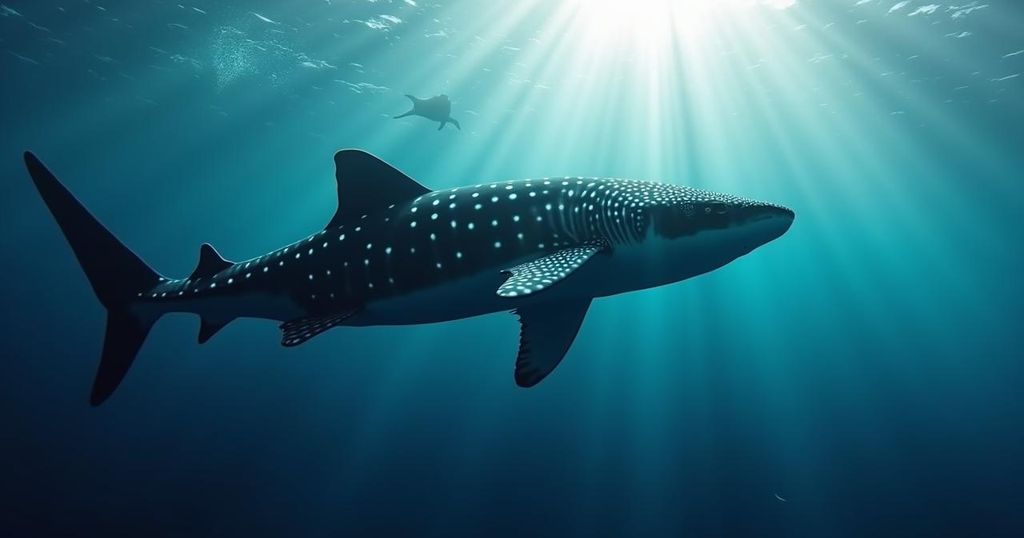A study published in *Nature Climate Change* suggests that climate change could dramatically elevate the risk of whale sharks colliding with large ships as they seek new habitats due to rising ocean temperatures. By 2100, the co-occurrence of whale sharks and vessels could increase 15,000-fold, significantly raising the threat to this already endangered species. The predictions underscore the necessity for strategies that incorporate climate change impacts in the management of endangered marine species.
Recent research published in Nature Climate Change indicates that climate change may significantly heighten the risks faced by whale sharks due to shipping activities. Conducted by scientists from the University of Southampton and the Marine Biological Association (MBA), this study suggests that as ocean temperatures rise, the endangered whale shark may be driven into new habitats that intersect with busy maritime shipping lanes. The research projects that, by the end of the century, the likelihood of whale sharks co-occurring with large vessels could increase by up to 15,000-fold compared to current levels. Lead author Dr. Freya Womersley from the University of Southampton and MBA stated, “These shifts in the whale sharks’ habitat were most extreme under high emission scenarios. A global reshuffling could lead to core habitat losses in some areas as well as increased co-occurrence with shipping traffic as oceans warm and other variables change.” Whale sharks, recognized as the largest fish species, display remarkable mobility and adaptability to temperature variations. However, they are notably susceptible to injuries or fatalities caused by large ships traversing global waters. The researchers utilized satellite tracking data of whale sharks in tandem with global climate models to assess potential distribution changes under three climate scenarios. The forecasts vary widely; under high emissions models, certain national waters could experience more than a 50% reduction in core whale shark habitats by the year 2100, especially in Asia. Conversely, a more sustainable development approach—aimed at limiting global warming to no more than 2°C—reveals potential habitat gains in regions such as Europe. Furthermore, the team analyzed shipping traffic densities in relation to these new habitat projections. Their findings indicated that some suitable areas for whale sharks indeed overlap with heavy shipping routes, including locations in the North Pacific Ocean, Eastern China Seas, and parts of the North Atlantic Ocean near Sierra Leone. Conversely, certain regions, like portions of the Gulf of Mexico, witnessed a decline in whale shark and shipping co-occurrence as core habitats migrated toward coastal regions, away from busy shipping lanes. Professor David Sims, co-author and Senior Research Fellow at the University of Southampton and MBA, commented, “The shifts we predict are likely to be less extreme if we are able to slow warming and mitigate climate change, suggesting that even complex, multi-factor impacts of climate change can be somewhat alleviated by our actions.” Overall, this research underscores the need to integrate climate change considerations into the management of endangered marine species, emphasizing the interconnectedness of environmental and human pressures. Dr. Womersley concluded, “We show that climate change has the potential to indirectly impact highly mobile marine species through interacting pressures of humans and the environment. This highlights the importance of factoring climate change into discussions around endangered species management.
The article addresses the implications of global warming on whale shark habitats, specifically the increased risk of collisions with large vessels as their habitats shift due to changing ocean temperatures. Whale sharks, being a vulnerable species, are subject to various threats, including those posed by maritime traffic. This research emphasizes the urgent need to consider climate change when developing strategies for conserving endangered marine species.
The findings of the study reveal alarming projections regarding the future of whale sharks, particularly in relation to increased shipping traffic due to climate change. It becomes evident that without effective measures to mitigate global warming, the habitat and safety of these marine giants are increasingly at risk. Protecting whale sharks will require not only efforts to reduce emissions but also strategic management of marine transport routes to safeguard their habitats.
Original Source: www.eurasiareview.com






